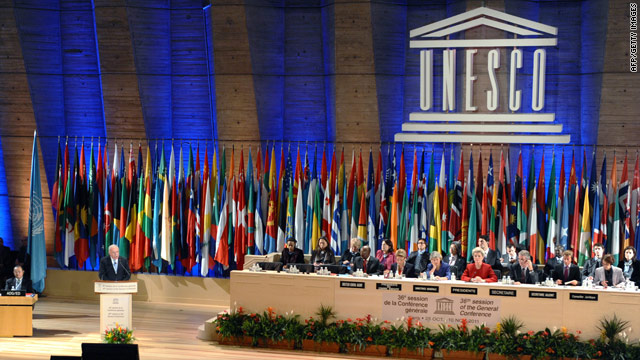Flawed US Policy on UNESCO Funding & Palestinian Statehood

A feature on the popular Daily Show highlighting US cuts to UNESCO funding has brought the troublesome American stance toward Palestinian statehood back in the forefront of international discussion. The United States has moved to cut funding to the United Nation's Educational, Cultural and Scientific Organization since the admission of Palestine as one of its members. The move was done in accordance with a US law which prohibits the funding of UN organizations that recognize Palestine as a member.
Palestine's ascension to membership in UNESCO, by a vote of 107-14 with 52 abstentions, signaled the cutting of over 20% of UNESCO funding by the United States, or about $80 million. UNESCO funds go to serve development programs overseas for education (at all levels), cultural heritage preservation, disaster early warning, sustainable development (both urban and rural), and a host of other activities around the world that serve to benefit humanity as a whole.
The law in the United States was aimed to force direct negotiations between the Palestinians and Israelis, but has yielded little to no substantial benefit in helping the overall peace process in the region. In the meantime, Israel continues to build settlements in Palestinian controlled territory and seize resources needed by Palestinians such as access to water.
One has to wonder what the American interest in Israel actually is, considering the negative consequences that have been endured by cause of supporting this country. From a purely policy oriented perspective, the American support of Israel has been a lightening rod of contention from the Muslim and Arab worlds, in exchange for what only appears to be money for our elected leader's campaigns. The argument that Israel has been a strong military arm for the United States in the region is moot, as it has been the cause of our need to have a strong military arm in the region in the first place. The American stance toward Israel is the snake that eats its own tail.
If the United States, and Israel, were truly interested in bringing about a genuine peace agreement with the Palestinians, the first step would require recognizing the Palestinians (and indeed, all non-Western peoples) as people. This simplest diplomatic nicety has been denied for over seventy years, since the foundations of the first Zionist settlements in the region and, indeed, for the entirety of the Western colonial history. How this has been such a hard concept for our culture to accept and work with, is anybody's guess. My own theory suggests either an excess lateralization of the left hemisphere, a deficit lateralization of the right hemisphere or both from amongst the people we allow to be our leaders. The fact remains we trip over ourselves when we indulge in these kinds of negative acting and negative treating forms of behavior, in very real and very demonstrable manners.
This isn't just about ideology. It's about how we functionally operate within the world. As this latest interaction with UNESCO suggests, it's precisely what we are lousy at doing, in spite of accomplishments and successes to the contrary.



